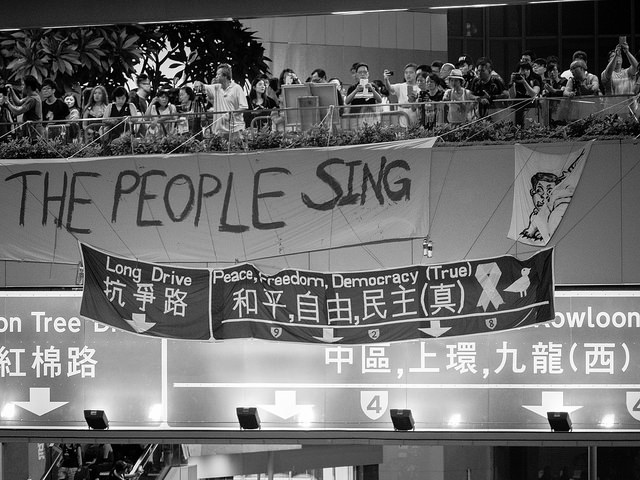"Hong Kong battle: capitalism vs communism"
October 17 Protests in Hong Kong can be linked to democracy or historic promise for reform, but Jake Elson, 20, a Correspondent from Banbury in Australia argues that creating a compromise between capitalism and communism is the real issue.
Protests in Hong Kong can be linked to democracy or historic promise for reform, but Jake Elson, 20, a Correspondent from Banbury in Australia argues that creating a compromise between capitalism and communism is the real issue.
By the time I write this, the Hong Kong protests have begun to dwindle in numbers. It’s characteristic of many long-term protests. The majority of people simply cannot afford to protest 24/7.
However, support still remains. An opinion poll conducted by the Hong Kong Polytechnic found that 59 per cent of ordinary Hong Kongers support the protesters. It is hard to ignore that, in what once was the pearl of British Asia, there is a strong antipathy toward the new colonial masters.
Of course, it’s worth remembering Hong Kong’s own history. The island itself was annexed by Britain “in perpetuity” in 1842. The mainland territory, the ‘New’ territory, was leased for 99 years from China in 1898. In China’s eyes, more so after 1949, it was a dark stain on their history. In their opinion, a rich and powerful hegemony bullied a weak and declining empire into both handing over land and becoming nothing more than a tributary state. In Britain’s eyes, the conquest of Hong Kong resulted from Imperial China reneging on trade agreements over opium.
After the Maoist takeover of China in 1949, hundreds of thousands of refugees poured into Hong Kong, fleeing Communism. Hong Kong, its population depleted after the Japanese occupation in World War Two, took them in. This was the beginning of what we see today is essentially a battle between capitalism and communism. Indeed, China itself attempted to force the British administration out by covertly supporting the 1968 riots. Although it failed dismally, it began the road to civil rights for ordinary Hong Kongers, which are behind the protests today
Hong Kong from that moment until the handover enjoyed, for a colony, a high level of civil rights – perhaps on par with mainland Britain. Schoolchildren were entitled to nine years compulsory but free education, social welfare was introduced, labour and health reforms – all this led to the high standard of living Hong Kong enjoys. However, one of the most important things that Hong Kong at this time underwent was an anti-corruption commission. By the time the Union flag was lowered for the last time in 1997, Hong Kong was the least corrupt society in Asia, and perhaps the world.
Surprisingly, and to the advantage of Chinese arguments, Britain never implemented a truly democratic parliament. That is until it was too late, and the handover was already set in stone. In 1994, Governor Chris Patten led the charge in increasing the size of the electorate, much to China’s disdain. Many of the electoral reforms of 1994 are still in place today.
And so, we are back at the situation today. It can be said that the protests on the streets of Hong Kong today are a culmination of 65 years of fear, frustration and promised reforms. For many of the students behind the protests, they have heard the stories of what their elders have termed ‘the good old days.’ For a society used to a western lifestyle, they view the Chinese Communist Party with suspicion and resentment. The reality is that the Communist Party, although by law forbidden from interfering with the Hong Kong Constitution and its laws, maintains a ‘power behind the throne ‘situation. There seem to be many Hong Kong tycoons, politicians and journalists apparently happy to play puppet. Therefore, despite being by law a free capitalist society, the Chinese Communist Party maintains a high degree of influence.
This influence is the crux of the protesters’ anger. Though the Chinese Communist Party has promised universal suffrage for the election of the Chief Executive, something that by law China still controls, it has done so on their own terms. A committee of 1,200 persons, hand-picked by China, will vet every potential candidate. This basically guarantees that any member will be a supporter of China. On top of that, corruption has increased in the 17 years since the handover, with certain members of the elite embroiled in scandals. Indeed, the (Royal) Hong Kong Police Force itself has faced allegations it has become a quasi-political tool of the Beijing elite.
Once again, Hong Kong is at the crossroads. The road it takes however is less clear. China has emphasized that it is uninterested in anyone else making decisions for Hong Kong. Indeed, it is the classic ‘my way or the highway’ attitude. However, one wonders if they are foolish enough to maintain that attitude in the face of an angry territory. China certainly wants to avoid a Tiananmen Square situation, yet will have to face the reality sooner or later that it will have to compromise in this battle between capitalism and communism.
photo credit: Willy AuYeung via photopin cc
…………………………………………………………………………………………………………………
About me:
I am a history buff, but also am into soccer. I referee soccer, and would like to go FIFA one day. I’m currently studying politics and international relations at Edith Cowan University. My aim is to become a police officer in Western Australia, and I would like to be Prime Minister one day.
I am a Conservative and a Monarchist, and believe in the role of the Commonwealth as a tool for good.
…………………………………………………………………………………………………………………
Opinions expressed in this article are those of the author and do not necessarily represent the views of the Commonwealth Youth Programme. Articles are published in a spirit of dialogue, respect and understanding. If you disagree, why not submit a response?
To learn more about becoming a Commonwealth Correspondent please visit: http://www.yourcommonwealth.org/submit-articles/commonwealthcorrespondents/
…………………………………………………………………………………………………………………




